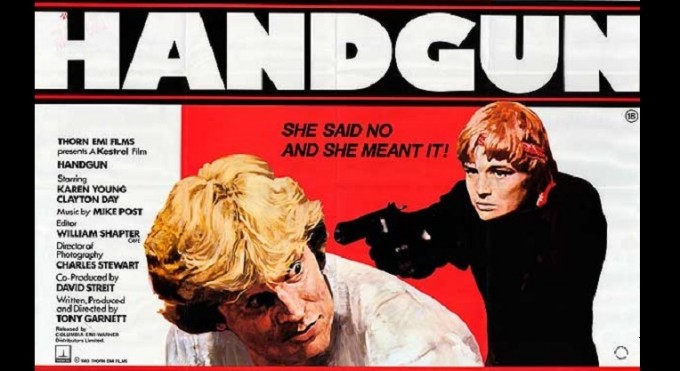Handgun Director Tony Garnett Interview

This week finally sees the release of cult classic revenge flick Handgun on DVD. Tony Garnett wrote and directed the brutal tale of a young woman ruthlessly seeking revenge after being raped at gunpoint. Perhaps best known for his work as a producer and co-writer of the beloved screen adaptation of Kes, Tony sat down to discuss the issues of sexual violence, gun ownership and vigilantism which remain as controversial today as at the time the film was made.
Here’s what he had to say…
What film makers influenced your work in directing Handgun?
No films in particular, but all the work has been influenced by post war Italian neo realism, like Bicycle Thieves; the wave of films from Eastern Europe, like Closely Observed Trains, the camera work of Coutard in, say, Breathless; and Joan Littlewood.
During the 1970s/80s there were a lot of female-lead revenge films, such as Lipstick and Ms. 45. Did you watch many of them at the time and what did you think of them? If not, what about Michael Winner’s infamous ‘Death Wish’ series?
I did see some. I never comment on other people’s films – I”m not a critic.
What influenced you to write Handgun? And do you think other writers/directors of other revenge films were influenced by similar issues?
I don’t know about other film makers. I had gone to America to learn about it and to get refreshed through facing new challenges. I wondered why such an hospitable people would want to settle disputes by shooting each other. Dallas seemed to be a useful focus. I spent time there, researching. American history tells one much The USA was founded on genocide; it talks peace and has the biggest armed forces in history; its borders are secure and its in no danger; it is an oppressive empire, but believes it spreads freedom and democracy. The possibility of violence is built into its constitution. Rape is not about sex, it’s about power and control, and it’s the conduit for hatred. I put the two together, played with the tropes of the genre and then went in another direction. I wanted to learn about the American psyche. Revealingly, some distributor figures were disappointed because they said the “rape was a turn off, not sexy”.
You wrote, as well as directed, Handgun. Would you have liked to direct a film from another person’s script or did you prefer to direct your own scripts?
There was no plan. It just happened that way. I wrote it and then thought why not direct it. I prefer producing, really. Too much hanging about with directing.
Revenge films often see the main character empowered by a gun, the aptly named Handgun is no different. Do you think these kind of revenge films were about inherently ‘American’ problems or could they have been set in the UK too?
As you know, there is an epidemic of rape over much of the world. It is particularly used as a weapon of war, especially civil war. The handgun is apt for America, and symbolic of power. So rape and handguns complemented each other for my purposes.
Did you find a big difference between making films in the US and making films in the UK?
Film crews are the same all over the world. They use a common language. I took a couple of colleagues from the UK and the rest were from Dallas and New York I was very pleased with all of them.
You produced, and were one of the writer’s, of Ken Loach’s adaptation of Kes. Did the ‘kitchen sink realism’ influence your writing and direction of Handgun?
I don’t know what “kitchen sink’ realism is. Sounds patronising to me. I’ve always wanted to respectfully research and then try to tell the truth about a particular world. I’m interested in the extraordinary which comes out of the ordinary, because no one is ordinary when you dig below the surface. Dallas or Barnsley – no difference.
Handgun is very critical of the courts system when it come to convicting rapists, but it also doesn’t hold up violence as the answer to violence. Do you think things have improved in the last 20 years in society?
Rape is a difficult crime to prosecute. Things have not improved much, progress is slow and that is due to the male prejudices of the society as a whole, not just the police. The problem is not the courts. The problem is the frequency of the crime. The solution is in how we are all brought up, and more should be done in the schools, for instance, to teach us respect Our society lacks love and respect.
Karen Young had an extremely difficult role to play in the film. How did you find her to work with during Handgun?
Karen had many arduous emotional moments shooting Handgun. She is the best kind of actor, she is emotionally available. We shot in sequence. She never flinched from going through Kathleen’s journey. I was very proud of her.
If you remade Handgun today, what would you change?
Each time you finish a film, you watch it and say, I know how to do that now – too bloody late. So, of course , I would rewrite it, make it less on the nose, fight to keep the nuances I was persuaded to cut etc. I would change one or two of the cast, but overall I was happy with most of them, especially Karen. All the faults are mine.
Handgun is out to own on DVD this week as part of The British Film Collection, check out the official Facebook page here: http://www.facebook.com/thebritishfilm